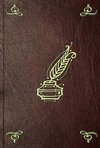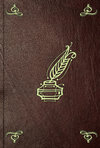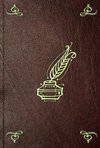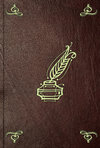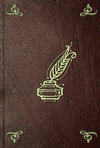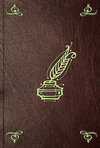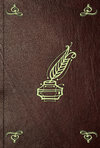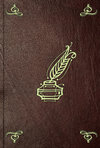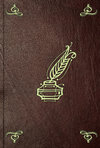Читать книгу: «The History of Sir Charles Grandison, Volume 4 (of 7)», страница 22
LETTER XLIII
MR. LOWTHER, TO JOHN ARNOLD, ESQ. (HIS BROTHER-IN-LAW) IN LONDON. BOLOGNA, MAY 5-16
I will now, my dear brother, give you a circumstantial account of our short, but flying journey. The 20th of April, O.S. early in the morning, we left Paris, and reached Lyons the 24th, at night.
Resting but a few hours, we set out for Pont Beauvoisin, where we arrived the following evening: There we bid adieu to France, and found ourselves in Savoy, equally noted for its poverty and rocky mountains. Indeed it was a total change of the scene. We had left behind us a blooming spring, which enlivened with its verdure the trees and hedges on the road we passed, and the meadows already smiled with flowers. The cheerful inhabitants were busy in adjusting their limits, lopping their trees, pruning their vines, tilling their fields: but when we entered Savoy, nature wore a very different face; and I must own, that my spirits were great sufferers by the change. Here we began to view on the nearer mountains, covered with ice and snow, notwithstanding the advanced season, the rigid winter, in frozen majesty, still preserving its domains: and arriving at St. Jean Maurienne the night of the 26th, the snow seemed as if it would dispute with us our passage; and horrible was the force of the boisterous winds, which sat full in our faces.
Overpowered by the fatigues I had undergone in the expedition we had made, the unseasonable coldness of the weather, and the fight of one of the worst countries under heaven, still clothed in snow, and deformed by continual hurricanes; I was here taken ill. Sir Charles was greatly concerned for my indisposition, which was increased by a great lowness of spirits. He attended upon me in person; and never had man a more kind and indulgent friend. Here we stayed two days; and then, my illness being principally owing to fatigue, I found myself enabled to proceed. At two of the clock in the morning of the 28th, we prosecuted our journey, in palpable darkness, and dismal weather, though the winds were somewhat laid, and reaching the foot of Mount Cenis by break of day, arrived at Lanebourg, a poor little village, so environed by high mountains, that for three months in the twelve, it is hardly visited by the cheering rays of the sun. Every object which here presents itself is excessively miserable. The people are generally of an olive complexion, with wens under their chins; some so monstrous, especially women, as quite disfigure them.
Here it is usual to unscrew and take in pieces the chaises, in order to carry them on mules over the mountain: and to put them together on the other side: For the Savoy side of the mountain is much more difficult to pass than the other. But Sir Charles chose not to lose time; and therefore lest the chaise to the care of the inn-keeper; proceeding, with all expedition, to gain the top of the hill.
The way we were carried, was as follows:—A kind of horse, as it is called with you, with two poles, like those of chairmen, was the vehicle; on which is secured a sort of elbow chair, in which the traveller sits. A man before, another behind, carry this open machine with so much swiftness, that they are continually running and skipping, like wild goats, from rock to rock, the four miles of that ascent. If a traveller were not prepossessed that these mountaineers are the surest-footed carriers in the universe, he would be in continual apprehensions of being overturned. I, who never undertook this journey before, must own, that I could not be so fearless, on this occasion as Sir Charles was, though he had very exactly described to me how every thing would be. Then, though the sky was clear when we passed this mountain, yet the cold wind blew quantities of frozen snow in our faces; insomuch that it seemed to me just as if people were employed, all the time we were passing, to wound us with the sharpest needles. They indeed call the wind that brings this sharp-pointed snow, The Tormenta.
An adventure, which any-where else might have appeared ridiculous, I was afraid would have proved fatal to one of our chairmen, as I will call them. I had flapt down my hat to screen my eyes from the fury of that deluge of sharp-pointed frozen-snow; and it was blown off my head, by a sudden gust, down the precipices: I gave it for lost, and was about to bind a handkerchief over the woolen-cap, which those people provide to tie under the chin; when one of the assistant carriers (for they are always six in number to every chair, in order to relieve one another) undertook to recover it. I thought it impossible to be done; the passage being, as I imagined, only practicable for birds: however, I promised him a crown reward, if he did. Never could the leaps of the most dexterous of rope-dancers be compared to those of this daring fellow: I saw him sometimes jumping from rock to rock, sometimes rolling down a declivity of snow like a ninepin, sometimes running, sometimes hopping, skipping; in short, he descended like lightning to the verge of a torrent, where he found the hat. He came up almost as quick, and appeared as little fatigued, as if he had never left us.
We arrived at the top in two hours, from Lanebourg; and the sun was pretty high above the horizon. Out of a hut, half-buried in snow, came some mountaineers, with two poor sledges, drawn by mules, to carry us through the Plain of Mount Cenis, as it is called, which is about four Italian miles in length, to the descent of the Italian side of the mountain. These sledges are not much different from the chairs, or sedans, or horse, we then quitted; only the two under poles are flat, and not so long as the others, and turning up a little at the end, to hinder them from sticking fast in the snow. To the fore-ends of the poles are fixed two round sticks, about two feet and a half long, which serve for a support and help to the man who guides the mule, who, running on the snow between the mule and the sledge, holds the sticks with each hand.
It was diverting to see the two sledgemen striving to outrun each other.
Encouraged by Sir Charles's generosity, we very soon arrived at the other end of the plain. The man who walked, or rather ran, between the sledge and the mule, made a continual noise; hallooing and beating the stubborn beast with his fists, which otherwise would be very slow in its motion.
At the end of this plain we found such another hut as that on the Lanebourg side. Here they took off the smoking mules from the sledges, to give them rest.
And now began the most extraordinary way of travelling that can be imagined. The descent of the mountain from the top of this side, to a small village called Novalesa, is four Italian miles. When the snow has filled up all the inequalities of the mountain, it looks, in many parts, as smooth and equal as a sugar-loaf. It is on the brink of this rapid descent that they put the sledge. The man who is to guide it, sits between the feet of the traveller, who is seated in the elbow-chair, with his legs at the outside of the sticks fixed at the fore-ends of the flat poles, and holds the two sticks with his hands; and when the sledge has gained the declivity, its own weight carries it down with surprising celerity. But as the immense irregular rocks under the snow make now and then some edges in the declivity, which, if not avoided, would overturn the sledge; the guide, who foresees the danger, by putting his foot strongly and dexterously in the snow next to the precipice, turns the machine, by help of the above-mentioned sticks, the contrary way, and by way of zig-zag goes to the bottom. Such was the velocity of this motion, that we dispatched these four miles in less than five minutes; and, when we arrived at Novalesa, hearing that the snow was very deep most of the way to Susa, and being pleased with our way of travelling, we had some mules put again to the sledges, and ran all the way to the very gates of that city, which is seven miles distant from Mount Cenis.
In our way we had a cursory view of the impregnable fortress of Brunetta, the greatest part of which is cut out of the solid rock, and commands that important pass.
We rested all night at Susa; and, having bought a very commodious post-chaise, we proceeded to Turin, where we dined; and from thence, the evening of May 2, O.S. got to Parma by way of Alexandria and Placentia, having purposely avoided the high road through Milan, as it would have cost us a few hours more time.
Sir Charles observed to me, when we were on the plain or flat top of Mount Cenis, that had not the winter been particularly long and severe, we should have had, instead of this terrible appearance of snow there, flowers starting up, as it were, under our feet, of various kinds, which are hardly to be met with anywhere else. One of the greatest dangers, he told me, in passing this mount in winter, arises from a ball of snow, which is blown down from the top by the wind, or falls down by some other accident; which, gathering all the way in its descent, becomes instantly of such a prodigious bigness, that there is hardly any avoiding being carried away with it, man and beast, and smothered in it. One of these balls we saw rolling down; but as it took another course than ours, we had no apprehension of danger from it.
At Parma we found expecting us, the bishop of Nocera, and a very reverend father, Marescotti by name; who expressed the utmost joy at the arrival of Sir Charles Grandison, and received me, at his recommendation, with a politeness which seems natural to them. I will not repeat what I have written before of this excellent young gentleman; intrepidity, bravery, discretion, as well as generosity, are conspicuous parts of his character. He is studious to avoid danger; but is unappalled in it. For humanity, benevolence, providence for others, to his very servants, I never met with his equal.
My reception from the noble family to which he has introduced me; the patient's case, (a very unhappy one!); and a description of this noble city, and the fine country about it; shall be the subject of my next. Assure all my friends of my health, and good wishes for them; and, my dear Arnold, believe me to be
Ever yours, &c.
LETTER XLIV
SIR CHARLES GRANDISON, TO DR. BARTLETT BOLOGNA, WEDNESDAY, MAY 10-21
I told you, my dear and reverend friend, that I should hardly write to you till I arrived in this city.
The affair of my executorship obliged me to stay a day longer at Paris than I intended; but I have put every thing relating to that trust in such a way, as to answer all my wishes.
Mr. Lowther wrote to Mr. Arnold, a friend of his in London, the particulars of the extraordinary affair we were engaged in between St. Denis and Paris; with desire that he would inform my friends of our arrival at that capital.
We were obliged to stop two days at St. Jean de Maurienne. The expedition we travelled with was too much for Mr. Lowther; and I expected, and was not disappointed, from the unusual backwardness of the season, to find the passage over Mount Cenis less agreeable than it usually is in the beginning of May.
The bishop of Nocera had offered to meet me any where on his side of the mountains. I wrote to him from Lyons, that I hoped to see him at Parma, on or about the very day that I was so fortunate as to reach the palace of the Count of Belvedere in that city; where I found, that he and Father Marescotti had arrived the evening before. They, as well as the count, expressed great joy to see me; and when I presented Mr. Lowther to them, with the praises due to his skill, and let them know the consultations I had had with eminent physicians of my own country on Lady Clementina's case, they invoked blessings upon us both, and would not be interrupted in them by my eager questions after the health and state of mind of the two dearest persons of their family.—Unhappy! very unhappy! said the bishop. Let us give you some refreshment, before we come to particulars.
To my repeated inquiries, Jeronymo, poor Jeronymo! said the bishop, is living, and that is all we can say.—The sight of you will be a cordial to his heart. Clementina is on her journey to Bologna from Naples. You desired to find her with us, and not at Naples. She is weak; is obliged to travel slowly. She will rest at Urbino two or three days. Dear creature! What has she not suffered from the cruelty of her cousin Laurana, as well as from her malady! The general has been, and is, indulgent to her. He is married to a lady of great merit, quality, and fortune. He has, at length, consented that we shall try this last experiment, as the hearts of my mother and now lately of my father, as well as mine, are in it. His lady would not be denied accompanying my sister; and as my brother could not bear being absent from her, he travels with them. I wish he had stayed at Naples. I hope, however, he will be as ready, as you will find us all, to acknowledge the favour of this visit, and the fatigue and trouble you have given yourself on our account.
As to my sister's bodily health, proceeded he, it is greatly impaired. We are almost hopeless, with regard to the state of her mind. She speaks not; she answers not any questions. Camilla is with her. She seems regardless of any body else. She has been told, that the general is married. His lady makes great court to her; but she heeds her not. We are in hopes, that my mother, on her return to Bologna, will engage her attention. She never yet was so bad as to forget her duty, either to God, or her parents. Sometimes Camilla thinks she pays some little attention to your name; but then she instantly starts, as in terror; looks round her with fear; puts her finger to her lips, as if she dreaded her cruel cousin Laurana should be told of her having heard it mentioned.
The bishop and father both regretted that she had been denied the requested interview. They were now, they said, convinced, that if that had been granted, and she had been left to Mrs. Beaumont's friendly care, a happy issue might have been hoped for: But now, said the bishop—Then sighed, and was silent.
I despatched Saunders, early the next morning, to Bologna, to procure convenient lodgings for me, and Mr. Lowther.
In the afternoon we set out for that city. The Count of Belvedere found an opportunity to let me know his unabated passion for Clementina, and that he had lately made overtures to marry her, notwithstanding her malady; having been advised, he said, by proper persons, that as it was not an hereditary, but an accidental disorder, it might be, in time, curable. He accompanied us about half way in our journey; and, at parting, Remember, chevalier, whispered he, that Clementina is the soul of my hope: I cannot forego that hope. No other woman will I ever call mine.
I heard him in silence: I admired him for his attachment: I pitied him.
He said, he would tell me more of his mind at Bologna.
We reached Bologna on the 15th, N.S. Saunders had engaged for me the lodgings I had before.
Our conversation on the road turned chiefly on the case of Signor Jeronymo. The bishop and father were highly pleased with the skill, founded on practice, which evidently appeared in all that Mr. Lowther said on the subject: and the bishop once intimated, that, be the event what it would, his journey to Italy should be made the most beneficial affair to him he had ever engaged in. Mr. Lowther replied, that as he was neither a necessitous nor a mean-spirited man, and had reason to be entirely satisfied with the terms I had already secured to him; he should take it unkindly, if any other reward were offered him.
Think, my dear Dr. Bartlett, what emotions I must have on entering, once more, the gates of the Porretta palace, though Clementina was not there.
I hastened up to my Jeronymo, who had been apprized of my arrival. The moment he saw me, Do I once more, said he, behold my friend, my Grandison? Let me embrace the dearest of men. Now, now, have I lived long enough. He bowed his head upon his pillow, and meditated me; his countenance shining with pleasure in defiance of pain.
The bishop entered: he could not be present at our first interview.
My lord, said Jeronymo, make it your care that my dear friend be treated, by every soul of our family, with the gratitude and respect which are due to his goodness. Methinks I am easier and happier, this moment, than I have been for the tedious space of time since I last saw him. He named that space of time to the day, and to the very hour of the day.
The marquis and marchioness signifying their pleasure to see me, the bishop led me to them. My reception from the marquis was kind; from his lady it was as that of a mother to a long-absent son. I had ever been, she was pleased to say, a fourth son in her eye; and now, that she had been informed that I had brought over with me a surgeon of experience, and the advice in writing of eminent physicians of my country, the obligations I had laid on their whole family, whatever were the success, were unreturnable.
I asked leave to introduce Mr. Lowther to them. They received him with great politeness, and recommended their Jeronymo to his best skill. Mr. Lowther's honest heart was engaged, by a reception so kind. He never, he told me afterwards, beheld so much pleasure and pain struggling in the same countenance, as in that of the lady; so fixed a melancholy, as in that of the marquis.
Mr. Lowther is a man of spirit, though a modest man. He is, as on every proper occasion I found, a man of piety; and has a heart tender as manly. Such a man, heart and hand, is qualified for a profession which is the most useful and certain in the art of healing. He is a man of sense and learning out of his profession, and happy in his address.
The two surgeons who now attend Signor Jeronymo, are both of this country. They were sent for. With the approbation, and at the request, of the family, I presented Mr. Lowther to them; but first gave them his character, as a modest man, as a man of skill, and experience; and told them, that he had quitted business, and wanted not either fame or fortune.
They acquainted him with the case, and their methods of proceeding. Mr. Lowther assisted in the dressings that very evening. Jeronymo would have me to be present. Mr. Lowther suggested an alteration in their method, but in so easy and gentle a manner, as if he doubted not, but such was their intention when the state of the wounds would admit of that method of treatment, that the gentlemen came readily into it. A great deal of matter had been collected, by means of the wrong methods pursued; and he proposed, if the patient's strength would bear it, to make an aperture below the principal wound, in order to discharge the matter downward; and he suggested the dressing with hollow tents and bandage, and to dismiss the large tents, with which they had been accustomed to distend the wound, to the extreme anguish of the patient, on pretence of keeping it open, to assist the discharge.
Let me now give you, my dear friend, a brief history of my Jeronymo's case, and of the circumstances which have attended it; by which you will be able to account for the difficulties of it, and how it has happened, that, in such a space of time, either the cure was not effected, or that the patient yielded not to the common destiny.
In lingering cases, patients or their friends are sometimes too apt to blame their physicians, and to listen to new recommendations. The surgeons attending this unhappy case, had been more than once changed. Signor Jeronymo, it seems, was unskilfully treated by the young surgeon of Cremona, who was first engaged: he neglected the most dangerous wound; and, when he attended to it, managed it wrong, for want of experience. He is, therefore, very properly dismissed.
The unhappy man had at first three wounds: one in his breast, which had been for some time healed; one in his shoulder, which, through his own impatience, having been too suddenly healed up, was obliged to be laid open again: the other, which is the most dangerous, in the hip-joint.
A surgeon of this place, and another of Padua, were next employed. The cure not advancing, a surgeon of eminence, from Paris, was sent for.
Mr. Lowther tells me, that this man's method was by far the most eligible; but that he undertook too much; since, from the first, there could not be any hope, from the nature of the wound in the hip-joint, that the patient could ever walk, without sticks or crutches: and of this opinion were the other two surgeons: but the French gentleman was so very pragmatical, that he would neither draw with them, nor give reasons for what he did; regarding them only as his assistants. They could not long bear this usage, and gave up to him in disgust.
How cruel is punctilio, among men of this science, in cases of difficulty and danger!
The present operators, when the two others had given up, were not, but by leave of the French gentleman, called in. He valuing himself on his practice in the Royal Hospital of Invalids at Paris, looked upon them as theorists only; and treated them with as little ceremony as he had shewn the others: so that at last, from their frequent differences, it became necessary to part with either him, or them. His pride, when he knew that this question was a subject of debate, would not allow him to leave the family an option. He made his demand: it was complied with; and he returned to Paris.
From what this gentleman threw out at parting, to the disparagement of the two others, Signor Jeronymo suspected their skill; and from a hint of this suspicion, as soon as I knew I should be welcome myself, I procured the favour of Mr. Lowther's attendance.
All Mr. Lowther's fear is, that Signor Jeronymo has been kept too long in hand by the different managements of the several operators; and that he will sink under the necessary process, through weakness of habit. But, however, he is of opinion, that it is requisite to confine him to a strict diet, and to deny him wine and fermented liquors, in which he has hitherto been indulged, against the opinion of his own operators, who have been too complaisant to his appetite.
An operation somewhat severe was performed on his shoulder yesterday morning. The Italian surgeons complimented Mr. Lowther with the lancet. They both praised his dexterity; and Signor Jeronymo, who will be consulted on every thing that he is to suffer, blessed his gentle hand.
At Mr. Lowther's request, a physician was yesterday consulted; who advised some gentle aperitives, as his strength will bear it; and some balsamics, to sweeten the blood and juices.
Mr. Lowther told me just now, that the fault of the gentlemen who have now the care of him, has not been want of skill, but of critical courage, and a too great solicitude to oblige their patient; which, by their own account, had made them forego several opportunities which had offered to assist nature. In short, sir, said he, your friend knows too much of his own case to be ruled, and too little to qualify him to direct what is to be done, especially as symptoms must have been frequently changing.
Mr. Lowther doubts not, he says, but he shall soon convince Jeronymo that he merits his confidence, and then he will exact it from him; and, in so doing, shall not only give weight to his own endeavours to serve him, but rid the other two gentlemen of embarrasments which have often given them diffidences, when resolution was necessary.
In the mean time the family here are delighted with Mr. Lowther. They will flatter themselves, they say, with hopes of their Jeronymo's recovery; which, however, Mr. Lowther, for fear of disappointment, does not encourage. Jeronymo himself owns, that his spirits are much revived; and we all know the power that the mind has over the body.
Thus have I given you, my reverend friend, a general notion of Jeronymo's case, as I understand it from Mr. Lowther's as general representation of it.
He has prevailed upon him to accept of an apartment adjoining to that of his patient. Jeronymo said, that when he knows he has so skilful a friend near him, he shall go to rest with confidence; and good rest is of the highest consequence to him. What a happiness, my dear Dr. Bartlett, will fall to my share, if I may be an humble instrument, in the hand of Providence, to heal this brother; and if his recovery shall lead the way to the restoration of his sister; each so known a lover of the other, that the world is more ready to attribute her malady to his misfortune and danger, than to any other cause! But how early days are these, on which my love and my compassion for persons so meritorious, embolden me to build such forward hopes!
Lady Clementina is now impatiently expected by every one. She is at Urbino. The general and his lady are with her. His haughty spirit cannot bear to think she should see me, or that my attendance on her should be thought of so much importance to her.
The marchioness, in a conversation that I have just now had with her, hinted this to me, and besought me to keep my temper, if his high notion of family and female honour should carry him out of his usual politeness.
I will give you, my dear friend, the particulars of this conversation.
She began with saying, that she did not, for her part, now think, that her beloved daughter, whom once she believed hardly any private man could deserve, was worthy of me, even were she to recover her reason.
I could not but guess the meaning of so high a compliment. What answer could I return that would not, on one hand, be capable of being thought cool; on the other, of being supposed interested; and as if I were looking forward to a reward that some of the family still think too high? But, while I knew my own motives, I could not be displeased with a lady who was not at liberty to act, in this point, according to her own will.
I only said, (and it was with truth,) That the calamity of the noble lady had endeared her to me, more than it was possible the most prosperous fortune could have done.
I, my good chevalier, may say any thing to you. We are undetermined about every thing. We know not what to propose, what to consent to. Your journey, on the first motion, though but from some of us, the dear creature continuing ill; you in possession of a considerable estate, exercising yourself in doing good in your native country; [You must think we took all opportunities of inquiring after the man once so likely to be one of us;] the first fortune in Italy, Olivia, though she is not a Clementina, pursuing you in hopes of calling herself yours; (for to England we hear she went, and there you own she is;) What obligations have you laid upon us!—What can we determine upon? What can we wish?
Providence and you, madam, shall direct my steps. I am in yours and your lord's power. The same uncertainty, from the same unhappy cause, leaves me not the thought, because not the power, of determination. The recovery of Lady Clementina and her brother, without a view to my own interest, fills up, at present, all the wishes of my heart.
Let me ask, said the lady, (it is for my own private satisfaction,) Were such a happy event, as to Clementina, to take place, could you, would you, think yourself bound by your former offers?
When I made those offers, madam, the situation on your side was the same that it is now: Lady Clementina was unhappy in her mind. My fortune, it is true, is higher: it is, indeed, as high as I wish it to be. I then declared, that if you would give me your Clementina, without insisting on one hard, on one indispensable article, I would renounce her fortune, and trust to my father's goodness to me for a provision. Shall my accession to the estate of my ancestors alter me?—No, madam: I never yet made an offer, that I receded from, the circumstances continuing the same. If, in the article of residence, the marquis, and you, and Clementina, would relax; I would acknowledge myself indebted to your goodness; but without conditioning for it.
I told you, said she, that I put this question only for my own private satisfaction: and I told you truth. I never will deceive or mislead you. Whenever I speak to you, it shall be as if, even in your own concerns, I spoke to a third person; and I shall not doubt but you will have the generosity to advise, as such, though against yourself.
May I be enabled to act worthy of your good opinion! I, madam, look upon myself as bound; you and yours are free.
What a pleasure is it, my dear Dr. Bartlett, to the proud heart of your friend, that I could say this!—Had I sought, in pursuance of my own inclinations, to engage the affections of the admirable Miss Byron, as I might with honour have endeavoured to do, had not the woes of this noble family, and the unhappy state of mind of their Clementina, so deeply affected me; I might have involved myself, and that loveliest of women, in difficulties which would have made such a heart as mine still more unhappy than it is.
Let me know, my dear Dr. Bartlett, that Miss Byron is happy. I rejoice, whatever be my own destiny, that I have not involved her in my uncertainties. The Countess of D– is a worthy woman: the earl, her son, is a good young man: Miss Byron merits such a mother; the countess such a daughter. How dear, how important, is her welfare to me!—You know your Grandison, my good Dr. Bartlett. Her friendship I presumed to ask: I dared not to wish to correspond with her. I rejoice, for her sake, that I trusted not my heart with such a proposal. What difficulties, my dear friend, have I had to encounter with!—God be praised, that I have nothing, with regard to these two incomparable women, to reproach myself with. I am persuaded that our prudence, if rashly we throw not ourselves into difficulties, and if we will exert it, and make a reliance on the proper assistance, is generally proportioned to our trials.
I asked the marchioness after Lady Sforza, and her daughter Laurana; and whether they were at Milan?












